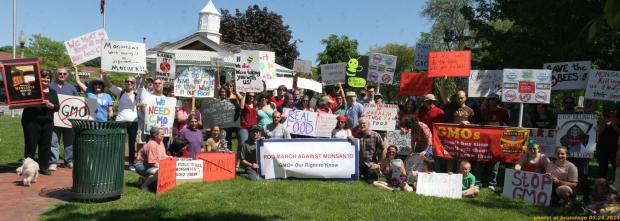March Against Monsanto
Primary tabs
P { margin-bottom: 0.08in; }
Seventy-five people came to the Twelve Corners park in Brighton May 24 in solidarity with a world-wide March Against Monsanto. Turnout was surprisingly good considering an error in publicizing the event caused most to not know about it until the day before.
Monsanto is the largest purveyor of Genetically Modified Organisms or GMO's . GMO's contain substances like the chemical glyphosphate. It is toxic to harmful insects but also toxic to humans and bees. They have been linked to the collapse of honeybee hives around the world. The bees not only produce honey but also pollinate many crops. Their absence would lead to severe food shortages especially of fruit. Cultivation and sale of GMO crops is currently banned in 26 countries including most of the European Union and Russia. Angry protesters in Hungary set fields of GMO crops on fire until that country banned them several years ago.
People in New York state aren't even demanding anything as forceful as a ban. Instead they are simply asking that products containing GMO's say so on their labels, which would allow consumers to choose whether or not to buy and eat them. Many countries that allow the sale of GMO's already require those labels. This is nothing radical but it is vehemently opposed by the industry.
Vermont has passed a law that will require GMO food to be labeled appropriately starting next year. A bill in New York that would make the same requirement is currently in the New York Senate and is co-sponsored by Senator Joe Robach-R of Greece. The bill is being fought by industry not just at the state but also at the federal level. It is important that anyone who would like to see its passage contact their Senator and Assembly member.











Comments
was that Louise Slaughter?